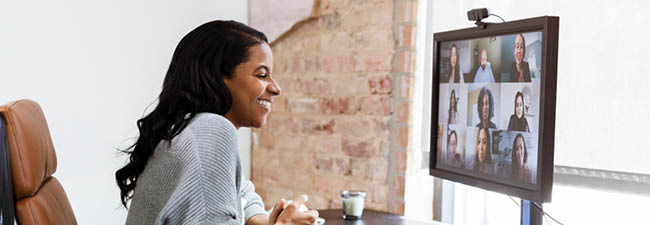IB faculty research focuses on context and culture’s influence on communication
International business associate professor Nancy Buchan researches how context and culture influence the way people communicate and how, in turn, that impacts the effectiveness of their interactions. Buchan discussed in The Conversation some of her recent research on how work teams have been impacted by the sudden and long-lasting shift to solely electronic communication because of the COVID-19 pandemic.
Published research:
“Zoom work relationships are a lot harder to build — unless you can pick up on colleagues’ nonverbal cues” — The Conversation, January 2021.
Why it matters:
- Relationship building is always crucial; it is the mediator — the lynchpin — to building attributes such as trust, team effectiveness, team efficiency and cohesion.
- Team building is much more important in a virtual setting rather than when communicating face-to-face precisely because it is so much harder to do.
- The large swing to remote work over the past 18 months because of the COVID-19 pandemic has impacted communication styles, which often impacts the effectiveness of work relationships and teams.
Ways to improve relationship building during videoconferencing:
- Be an engaged listener; put down the phone and stop looking at other screens, truly try to listen to what the other person is saying and ask questions of them to confirm or clarify.
- Pay attention to and try to understand nonverbal cues — things like body language, tone of voice, expressiveness and eye gaze.
“In my International Negotiations course, we do a series of negotiations that demonstrate precisely that — students negotiate with someone from their own culture and then with someone from a different culture, and we find that joint outcomes drop significantly in the second scenario. Now with adding on the layer of differences in technology — in going from face-to-face interactions to virtual — we see that communication becomes more difficult yet again. The keys, though, remain the same; you must remain committed and motivated to truly listen to your counterpart and endeavor to understand the nonverbal cues that are being sent,” Buchan said.
About Nancy Buchan:
- Buchan joined the Moore School’s international business department in August 2006 as an associate professor, served as director of the undergraduate international business program from 2012-1016 and associate dean of the undergraduate program from 2014-2018. she was named a Moore Research Fellow in 2014.
- Her research combines the methodology of experimental economics with theory from psychology, sociology and political science to understand the factors that influence the development of trust and cooperation in cross-cultural relationships.
- Buchan teaches international marketing and international negotiations at the undergraduate and graduate level. She also leads a number of international business professional development courses for USC’s Executive Education.
- She earned her bachelor’s degree in economics and international relations at the University of Wisconsin, a master’s in international studies and a doctorate in marketing, both from the University of Pennsylvania.
Buchan researched this topic with Wendi Adair, a professor of industrial-organizational psychology from the University of Waterloo, and Xiao-Ping Chen, a professor in business administration from the University of Washington
Ongoing research:
Buchan and her colleagues recently published another piece with The Conversation entitled “Having COVID-19 or being close to others who get it may make you more charitable”. Buchan’s research team included Orgul Ozturk, a Moore School economics associate professor, and Gianluca Grimalda, a researcher of experimental economics at the Kiel Institute for the World Economy. Read the full article.
